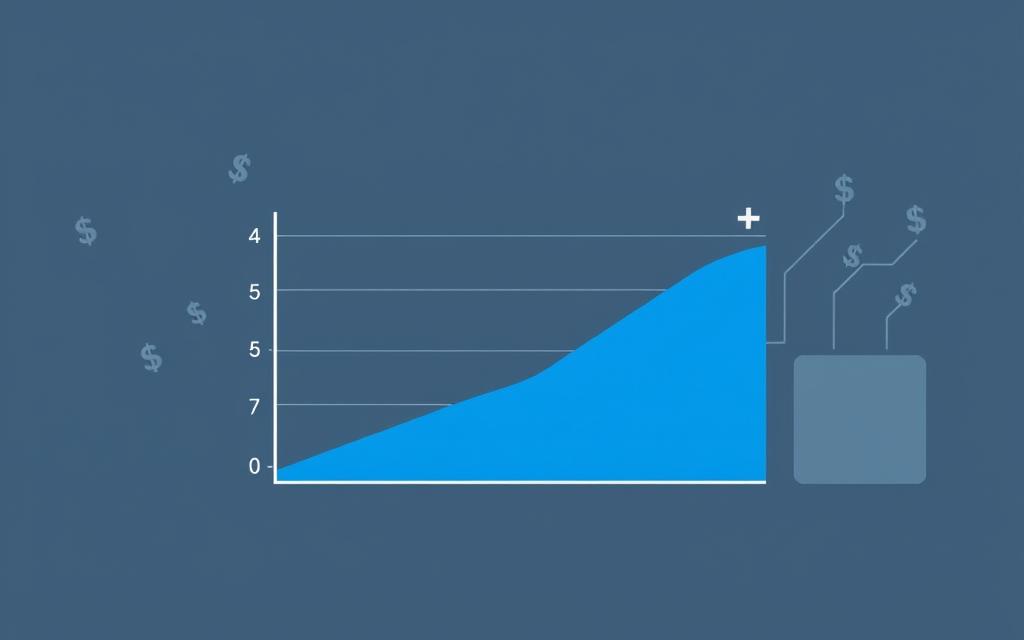Advertisement
Nearly 30% of Americans have a credit score below 630. This can really limit their financial options. A good credit score is key for getting loans, credit cards, and even apartments. Learning how to manage and enhance your credit score can greatly improve your financial health.
A healthy credit score can lead to better financial products and lower interest rates. It’s important to understand what affects your credit score and how to improve it. By doing this, you’re on your way to a stronger financial future.
Understanding Your Credit Score
Learning about your credit score can really enhance your credit standing. It’s a three-digit number that shows how trustworthy you are to lenders.
What is a Credit Score?
Your credit score comes from your credit history. This includes info on past loans, credit cards, and how you paid them back. The FICO score is the most common, ranging from 300 to 850. A higher score means you’re seen as a lower risk by lenders.
Why Your Credit Score Matters
Your credit score matters a lot when you apply for loans or credit cards. It decides the interest rate you get and if you’ll be approved. A good score can help you boost your credit score over time by getting you better loan terms.
| Credit Score Range | Credit Rating | Interest Rate |
|---|---|---|
| 750-850 | Excellent | Low |
| 700-749 | Good | Moderate |
| 650-699 | Fair | Higher |
| Below 650 | Poor | Very High |
Knowing and managing your credit score well can bring big financial benefits. You’ll get lower interest rates on loans and credit cards. This makes it easier to reach your financial goals.
Key Components of Your Credit Score
To raise your credit rating, it’s important to understand what makes up your score. Your credit score is a complex figure. It’s made up of several key components, each playing a role in your creditworthiness.
Payment History
Payment history is a big part of your credit score. It shows if you pay your debts on time. Late payments can hurt your score, but paying on time can significantly boost your credit rating.
Credit Utilization
Credit utilization is how much of your available credit you use. Keeping this low is key, as high usage can show lenders you’re a higher risk. Try to use less than 30% of your available credit to help your score.
Length of Credit History
A longer credit history is seen as better. It gives lenders a fuller picture of your credit behavior. This includes the age of your oldest account and the average age of all accounts.
New Credit Accounts
Opening many new credit accounts quickly can hurt your score. It may suggest you’re taking on too much debt. But, having a mix of credit types can be good if managed well.
Knowing these components helps you see where to improve. Here’s a quick summary of the key components and their importance:
| Component | Importance |
|---|---|
| Payment History | 35% |
| Credit Utilization | 30% |
| Length of Credit History | 15% |
| New Credit Accounts | 10% |
By focusing on these areas and adopting good credit habits, you can significantly improve your credit score over time. Regular monitoring and a strategic approach to credit management are key to achieving a higher credit rating.
Common Myths About Credit Scores
Many people don’t understand credit scores well. They believe myths that can hurt their finances. Credit scores are key for loans, interest rates, and even renting apartments. But, wrong beliefs can lead to bad financial choices.
Checking Your Score Hurts It
One big myth is that checking your score lowers it. This is not true. When you check your score yourself, it’s a soft inquiry. Soft inquiries don’t hurt your score. They’re for personal use.
On the other hand, hard inquiries from lenders can lower your score. But, these aren’t from your personal checks.
It’s good to check your score often. You can get a free report from Equifax, Experian, and TransUnion once a year. This helps you see where you stand and how to get better.
Closing Old Accounts Helps Your Score
Another myth is that closing old accounts boosts your score. But, closing accounts can actually hurt your score. Your credit history length is very important.
Old accounts are good because they make your history longer. Closing them can make your average age shorter. This might lower your score.
Instead of closing accounts, keep them open. Use them a little to keep them active. This helps your credit history stay positive. It also helps with credit utilization, which is another important factor.
Here are some tips for better credit score management:
- Check your credit report often for mistakes or unauthorized accounts.
- Keep old accounts open to keep your credit history long.
- Don’t apply for too many credit cards or loans at once.
- Keep your credit usage under 30% of what’s available.
By knowing and avoiding these myths, you can improve your credit score. This means being careful with inquiries, keeping your history long, and managing your credit use well. With these steps, you can make your credit score better over time. This will help your financial health and open up more opportunities.
Steps to Improve Your Credit Score
To improve your credit score, first understand what affects it. Your credit score is key for lenders to see if you’re reliable with money.
Check Your Credit Report
Start by checking your credit report for mistakes. You can get a free report from Equifax, Experian, and TransUnion.
Looking over your report helps spot any mistakes that might hurt your score.
Dispute Any Errors
If you spot mistakes, tell the credit agency. You can do this online, by phone, or by mail. Make sure to back up your claims with proof.
Common mistakes include wrong personal info, accounts that aren’t yours, or late fees for payments you made on time.
Pay Your Bills on Time
How you pay your bills is a big part of your score. Paying on time is key to a good score.
Use reminders or automate payments to avoid missing any.
| Action | Impact on Credit Score | Timeline |
|---|---|---|
| Check Credit Report | Identify errors | Immediate |
| Dispute Errors | Correct inaccuracies | 30-60 days |
| Pay Bills on Time | Improve payment history | Ongoing |
By taking these steps and keeping good credit habits, you can boost your score over time.
The Role of Credit Utilization
How you use credit greatly affects your credit score. Credit utilization is the percentage of available credit you’re using. It’s key in showing how trustworthy you are with money.

What is Credit Utilization?
Credit utilization is found by dividing the credit used by the credit available. For example, if you have a $1,000 credit card limit and use $300, your ratio is 30%. Lenders like it when this number is lower.
How to Lower Your Credit Utilization Ratio
Lowering your credit utilization ratio can boost your credit score. Here are some tips:
- Pay down your balances: The best way to lower your ratio is to pay off what you owe.
- Increase your credit limit: Asking for a higher limit can help, but don’t use it to buy more things.
- Spread your charges across multiple cards: Using different cards for different purchases can keep each ratio low.
It’s good to keep your credit utilization ratio under 30%, even better under 10%. By managing your credit well, you can improve your credit score a lot.
Building a Positive Credit History
A good credit history can really boost your credit score. This opens up better financial opportunities. To get there, you need to know the right strategies for a strong credit profile.
Managing your current credit accounts well is key. This means paying on time and not using too much credit.
Keeping Old Credit Accounts Open
Keeping old accounts open is a smart move. It helps keep your credit history long, which is good for your score. Closing accounts can hurt your credit score by affecting your credit usage and age.
| Benefits | Impact on Credit Score |
|---|---|
| Longer Credit History | Positive |
| Credit Utilization Ratio | Negative if closed |
Being an Authorized User
Being an authorized user on someone’s account is another good strategy. This is often a family member or a trusted friend with good credit. It can help boost your credit score.
But, make sure the account holder has good credit. Their actions will affect your score.
By using these strategies, you can build a positive credit history. This will improve your financial credibility and help you reach your financial goals.
The Impact of New Credit Inquiries
Knowing how new credit inquiries affect your score is key to a good credit profile. When you apply for credit, lenders check your report to see if you’re a good risk.
New credit inquiries can change your score, but how much depends on the type. There are hard and soft inquiries.
Distinguishing Between Hard and Soft Inquiries
Hard inquiries happen when lenders check your report for a loan or credit card. They can lower your score because they might see you as riskier.
Soft inquiries don’t change your score. They happen when you check your report or a lender does a pre-approval check. These are not seen by lenders and don’t hurt your score.
Minimizing the Impact of Hard Inquiries
To lessen the blow of hard inquiries, try these tips:
- Only apply for credit when you really need it. Don’t apply for many things at once.
- Look for credit deals in a short time. For example, when shopping for a mortgage or car loan, many inquiries in a short time are seen as one.
- Check your credit report often to make sure it’s right.
Knowing the difference between hard and soft inquiries and using strategies to reduce hard inquiries can improve your credit over time.
| Inquiry Type | Impact on Credit Score | Visibility to Lenders |
|---|---|---|
| Hard Inquiry | Temporary negative impact | Visible |
| Soft Inquiry | No impact | Not visible |
Utilizing Credit Repair Services
Knowing when and how to use credit repair services can greatly help you raise your credit rating. These services are great for people who struggle with their credit scores. They help you deal with the complex world of credit reporting and scoring.
When to Consider Professional Help
If you’re finding it hard to manage your credit score alone, it’s time to think about getting help. This is true if your credit report has many errors, you’re dealing with collections, or you just need help improving your score.
Credit repair services have the knowledge to fix mistakes, talk to creditors, and make a plan to boost your credit. They’re a big help if you don’t know much about credit or if you’ve tried to improve your score but haven’t seen results.
What to Look for in a Credit Repair Company
When picking a credit repair company, do your homework. Look for ones with a good reputation, clear prices, and a solid understanding of what they do. Stay away from companies that promise too much or ask for money upfront. These are often scams.
- A good credit repair company will give you a detailed look at your credit report.
- They should create a plan that fits your specific credit problems.
- They should keep you updated and talk to you often during the process.
By choosing a reputable credit repair service and working with them, you can make big strides in improving your credit score. This will help you reach your financial goals.
Monitoring Your Credit Score
Checking your credit score is more than just looking at a number. It’s about taking control of your financial future. By regularly checking your score, you can keep track of your credit health. This helps you make smart choices about your money.
Tools and Apps to Track Your Score
Many tools and apps can help you keep an eye on your credit score. Services like Credit Karma, Experian, and TransUnion offer free monitoring. They give you updates on your score and report regularly.
These platforms also have features like credit score simulators. They show you how different choices might affect your score. “Credit monitoring is a powerful tool for managing your financial health,” says a financial expert. “It gives you the insights you need to make smart decisions about credit.”
Understanding Score Changes Over Time
It’s important to know why your credit score changes. Things like payment history, credit use, and new inquiries can affect it. By checking your report often, you can spot areas to improve.
For example, if your credit use is too high, paying down debt can help. This can boost your score over time. Keeping an eye on your score and knowing what affects it are key to good credit management.
By being informed and proactive, you can keep a good credit score. This is vital for reaching your financial goals. Whether it’s buying a home, getting a car loan, or just having credit when you need it.
Maintaining a Healthy Credit Score
A good credit score is key for financial health and freedom. To keep your score strong, use long-term strategies that help improve your credit.
Effective Long-Term Strategies
Here are some tips to boost your credit score: check your credit report often, use less than 30% of your available credit, and don’t apply for many credit cards at once. These steps can greatly improve your credit health.
Financial Habits Matter
Good financial habits are essential for a healthy credit score. Pay bills on time, keep old accounts open, and watch out for too many credit checks. By following these tips, you can build a solid credit base for the future.



